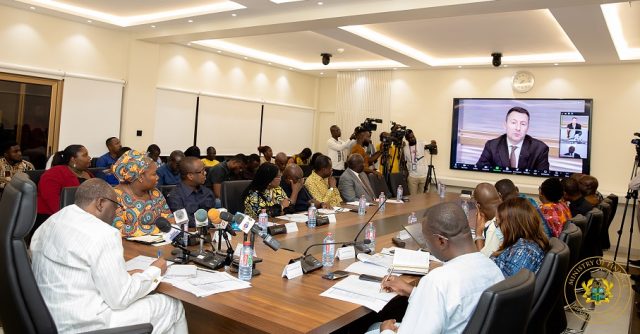A Professor at the Economics Department of the University of Ghana, Godfred Bokpin has said the approval of the first review of Ghana’s programme with the International Monetary Fund (IMF) by the board bodes well for the economy.
He described the approval as positive news given that it took quite some time for the endorsement to be done.
Speaking on the Business Focus on TV3 Monday, January 22, Prof Bokpin said “It is positive news. Remember that the 32 million people in Ghana, for the past three months, all that we have been doing is waiting for $600 million from the IMF and then some $550 million from the World Bank to support an economy that is worth over $70 billion. So, to the extent that the board had met and approved the first review, it is good news.
“Bear in mind the journey had been difficult for Ghana and getting support now is becoming very costly, even getting the programme approved in the first place took us quite a lot of negotiations.”
The Executive Board of the Fund approved Ghana’s second tranche of US$600 million for immediate disbursement.
The approval of the loan facility brings the total disbursement for the country’s implementation of an IMF-supported Post COVID-19 Programme for Economic Growth (PC-PEG) to US$1.2 billion.
This comes about a week after the country secured an agreement with the Official Creditor Committee, leading to the Fund’s endorsement of the country’s First Review of the three-year US$3b programme.
Speaking at a joint press briefing with the IMF, the Finance Minister, Ken Ofori-Atta described the development as a “pivotal milestone” in the country’s programme implementation.
“In truth, the agreement reached with official creditors is a powerful vote of confidence in our economic strategy. The gains made so far from the implementation of the IMF Supported PC-PEG has been remarkable,” he said.
He added that: “Consequently, this endorsement has unlocked a US$600 million disbursement from the IMF and will pave the way for an additional US$300 million disbursement from the World Bank under the Development Policy Operation Financing by the end of February.”
Mr Ofori-Atta also indicated that the country expected the World Bank to approve US$250 million to support the Ghana Financial Stability Fund, saying that: “these resources would significantly bolster our economic recovery efforts.”
“Going forward, strong, and ambitious structural reforms will be implemented in the areas of tax policy, public financial management, financial, energy and cocoa sectors to support our fiscal consolidation and growth agenda,” he pledged.
Commenting on price and financial stability, Dr Ernest Addison, the Governor of the Bank of Ghana (BoG), said that in 2024, the government would continue to implement sound policies to ease inflation further.
That, he said was firmly anchored towards Ghana’s single digit inflation objective. “In this regard, the Bank of Ghana will continue to monitor both domestic and external developments and respond appropriately to ensure that the downward inflation trajectory observed in recent months is sustained without undermining growth,” Dr Addison said.
“Although a challenging year confronts us, we remain confident about the ongoing economic recovery process and would want to stress the importance of executing the needed structural reforms to support a better functioning of the economy. These structural reforms will be in ensuring long term sustainability of performance,” the Central Bank Governor stated.
Mr Stephane Roudet, IMF Mission Chief for Ghana, said that the US$600m would be disbursed to the accounts of the Bank of Ghana in a matter of hours.
He noted that despite the difficult economic environment, the reforms being implemented by the Ghanaian Authorities had started bearing fruit, with signs of economic stabilisation emerging.
He stated that the Ghanaian economy had proven more resilient than it was initially envisioned, as inflation was declining rapidly, while fiscal and external positions were also improving.
Mr Roudet also stated that the Bank of Ghana’s international reserves have been increasing and exchange rate volatility decreasing but noted that “the road to full stabilisation will be long.”
The IMF Mission Chief, therefore, encouraged the government to ensure that it addressed outstanding challenges [including reaching commercial creditors agreement] through determined and steadfast policies and reform implementation.
The post IMF deal: Board’s approval of Ghana’s first review good for the economy – Bokpin first appeared on 3News – First In News | Ghana News Updates.


















